On July 7th I offered a workshop at the Canadian School Boards Association’s National Conference entitled, “Getting Serious About Culture”:
“Culture is not the most important thing, it’s the only thing.”
– Jim Sinegal, Co-founder and former CEO, Costco
Is this true for schools and school districts? Having worked with districts across Canada, Dean Shareski has discovered some important ideas about building community and creating cultures where students, teachers and leaders feel empowered and work together for a better learning environment for students. This session will provide an opportunity for participants to share, gain insight and develop plans to create a powerful learning culture.
In preparation for this, I sent out an informal survey on Twitter to get a sense of people’s perception of their own district. I was pleasantly surprised. I defined culture as, “the beliefs, perceptions, relationships, attitudes, and written and unwritten rules that shape and influence every aspect of how a school functions.”
I received 146 responses and here are the results:
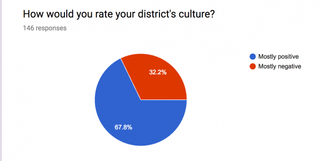
(these were the top answers)
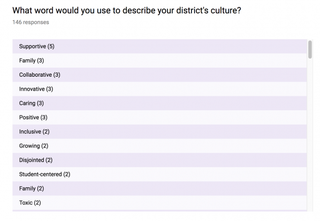
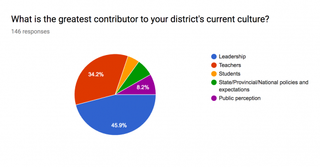
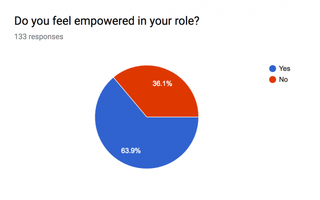
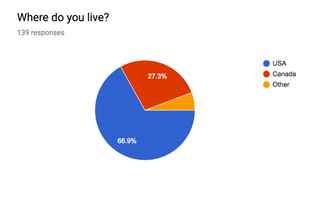
I also ask for any additional thoughts, here are a few:
Empowered in my classroom, but not so much outside my classroom.
Wanted to answer yes and no. Sometimes I feel empowered.I sometimes feel empowered and other times my power is reduced by the siloed nature of my district.
The leadership and teachers have completely different thoughts on how the district should proceed. Inconsistent initiatives have caused this rift.I worked in a school where the culture was a mess. The teachers worked well together but it was us vs. them (administration) and it was awful. I now work in a school where teachers matter, admin pitches in whenever and wherever needed, and it all leads to what is best for the students. It is a phenomenal place to teach and learn.
Leadership without vision creates a culture of apathy
You can access all the results and responses for yourself.
I totally acknowledge the non-scientific results of this survey but was still curious to hear from a reasonably broad audience of what I assume is mostly teachers. The challenge of creating a positive culture is not easy. Given the current climate of education worldwide, the job is not getting easier. Yet, these people (teachers) have a pretty positive outlook.
My views on culture are largely based on the various districts I work with across Canada and the US as well as my interactions with my global network. The work I do with Discovery Education, generally has me working with the best districts. As well, I interact with a large cross section of stakeholders from Superintendents to teachers. I’ve learned a great deal from these people and will constantly probe them to get their perspectives about culture. With these top districts, there is little disconnect between what leadership and teachers see as the vision for students.
Yet, it’s difficult to deny that the health and well-being of districts are often in jeopardy. Between the ongoing mental health challenges of young people to the continued budgetary restraints and the pressures to perform, developing a healthy thriving culture is hard.
In my session, I explored the simple idea that I wrote about earlier about choosing what to lead with. Leading isn’t always about balance as “balance” is the default answer to suggest you’re trying to do it all. Great cultures aren’t about doing everything. Great cultures are about choosing what matters most. The massive and complex goals of schools cannot be denied and ignored but being about something, something specific, is what creates positive cultures.
cross-posted at ideasandthoughts.org
Dean Shareski is the Community Manager of the Canadian DEN (Discovery Educators Network) and lecturer for the University of Regina. With 24 years of experience as a K12 educator and consultant, he specializes in the use of technology in the classroom. Read more at ideasandthoughts.org.
Disclaimer: This weblog contains the opinions and ideas of Dean Shareski. While there may be references to my work and content which relates directly to my work, the ideas are mine alone and are not necessarily shared by my employer.

